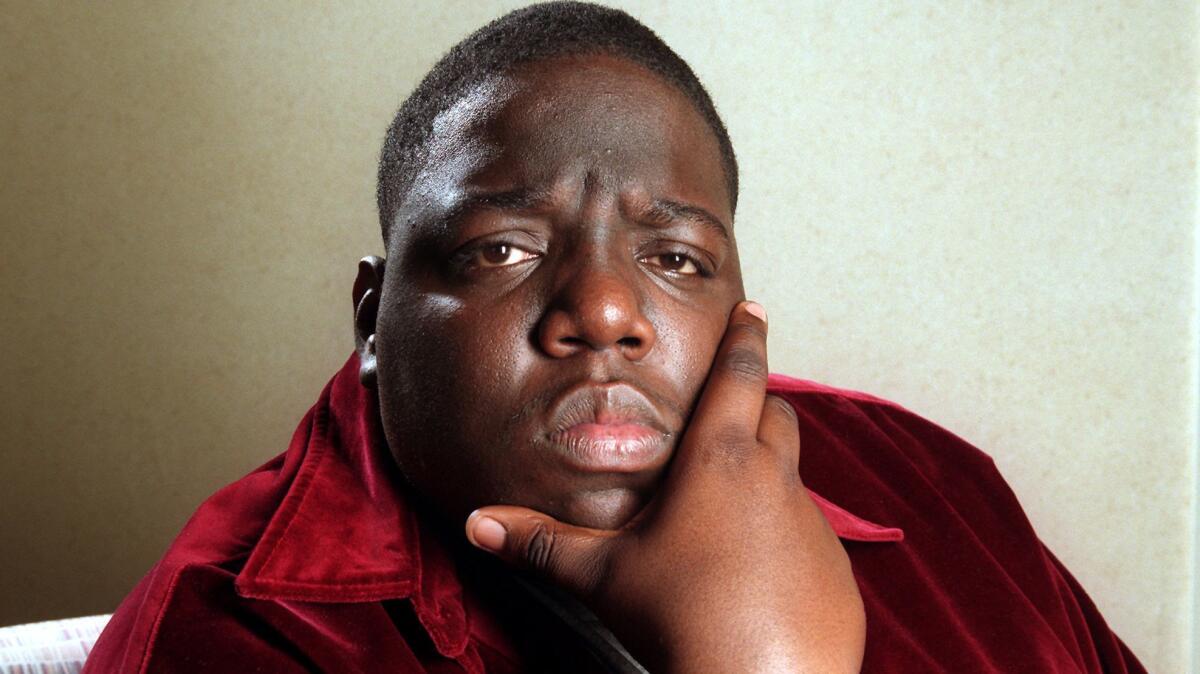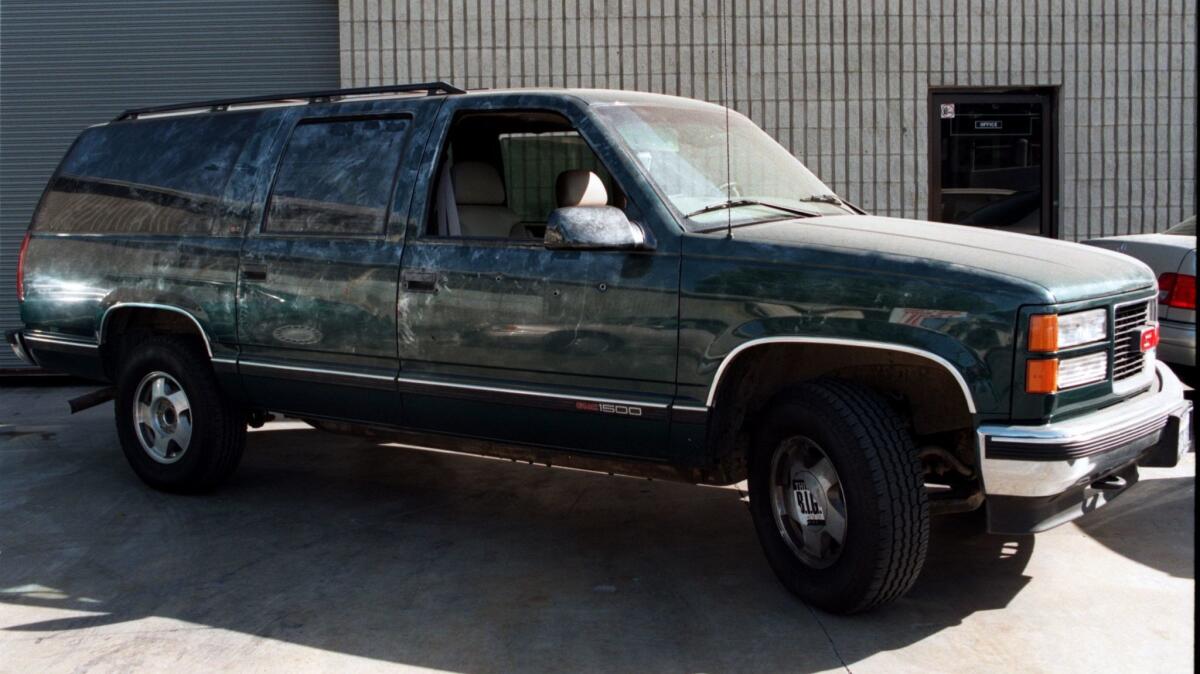20 years later, Notorious B.I.G.’s killing remains one of L.A.’s biggest unsolved homicides

- Share via
Notorious B.I.G. was leaving a music industry party at the Petersen Automotive Museum, sitting in the front passenger seat of a Chevrolet Suburban, when his killer pulled up alongside in a dark Chevy Impala.
As the SUV idled at a stoplight, the gunman opened fire, hitting the 24-year-old rap star, who was also known as Biggie Smalls, four times. He was rushed to Cedars-Sinai Medical Center, where he was pronounced dead shortly after 1 a.m. on March 9, 1997.
For the record:
11:48 a.m. Jan. 23, 2025A previous version of this article said that ex-LAPD Officer David A. Mack quit the force in 1999. It was Det. Russell Poole who quit in 1999.
The fatal round entered his right hip and ripped through his liver, lung and heart.
Despite numerous investigations by the Los Angeles Police Department, lawsuits, books and a plethora of allegations, the 20-year-old slaying of the performer whose real name was Christopher Wallace remains officially unsolved.
Wallace’s slaying came just six months after rap rival Tupac Shakur was gunned down in Las Vegas. The two killings would become forever intertwined as observers theorized that the violence was fueled by an East Coast-West Coast rivalry.
Shakur’s death also remains unsolved.
In Wallace’s case, many of those who investigated the killing say the likely culprits are long-gone gangsters. Exactly who they were and what motivated them remains a mystery.
“The shooter is most likely dead. You cannot ask him who paid him,” said Kevin McClure, a former LAPD captain who oversaw the investigation and is now the Montebello police chief. “We don’t know who gave the money.”
McClure shut down a task force on the killing in 2010 because it was spinning its wheels. “We kept pounding the doors on the same cold leads,” he said.
Like many cold cases, however, someone may come forward in the future with answers, McClure said.
As with many of L.A.’s legendary unsolved cases, it is assigned to a member of the LAPD’s elite Robbery-Homicide Division. Det. Daryn Dupree currently has the Wallace investigation. Dupree also worked on the Grim Sleeper serial killer case.
“It is an open case. We are still actively investigating, and we constantly discuss the disposition of the case with the district attorney’s office,” said Capt. William Hayes, who heads the division.
The slaying has spawned a cottage industry of books, documentaries and magazine articles exploring possible conspiracy theories. A couple of movies are also in the works.

Among the theories pushed by one now-deceased LAPD detective was that dirty cops connected to the Rampart corruption scandal were involved in the slaying.
In 2006, then-LAPD Chief William J. Bratton, who was fed up with speculation over the killing, launched the task force of senior homicide detectives in an effort to hunt down the killer.
The probe followed a wrongful-death lawsuit filed against the city by the rapper’s mother, Voletta Wallace, and other relatives.
In court documents, the family alleged that ex-LAPD Officer David A. Mack conspired with rap impresario Marion “Suge” Knight, then the owner of Death Row Records, to have Wallace ambushed. The family contended in the suit that Mack arranged for a college friend to carry out the attack. Mack, the college friend and Knight have all denied any involvement. The family dropped the lawsuit in 2010.
The theory that the three conspired to kill Wallace was first advanced in 1998 by then-LAPD Det. Russell Poole, an investigator in the Robbery-Homicide Division who worked about a year on the case. Poole will be played by Johnny Depp in an upcoming movie on the investigation.
Poole began scrutinizing Mack after he was arrested in December 1997 on suspicion of bank robbery. Mack was later convicted of robbery and is serving a 14-year prison term. Poole quit the police force in 1999 after a series of disputes with his superiors. He died in 2015.
Document: Autopsy of Christopher ‘Notorious B.I.G.’ Wallace »
The 2006 LAPD task force examined two different theories for the killing. The first hypothesis was that Wallace was killed by a member of Compton’s vicious Southside Crips gang as part of a bicoastal rap feud linked to Shakur’s death, law enforcement sources said.
The investigators developed a second theory that Wallace was killed in retaliation for Shakur’s death by a Blood gang member hired by Knight.
Knight, who is now facing a separate murder charge, has repeatedly denied any involvement in Wallace’s killing. The task force worked with a 72-volume “murder book,” the collection of evidence in the case, that was kept in its own office. Task force member Greg Kading, in his book “Murder Rap,” alleged that now-deceased Wardell “Poochie” Fouse — a Mob Piru Blood gang member from Compton — shot Wallace. He wrote that the killing was revenge for Shakur’s slaying and that powerful East Coast hip-hop figures were behind the Vegas slaying.
While no one has ever been arrested in Shakur’s death, Las Vegas police named Orlando Anderson, a reputed Crips member, as the suspect in the slaying. Anderson died a year later in a drug-related shootout at a Compton carwash.
Twitter: @lacrimes
More to Read
Sign up for Essential California
The most important California stories and recommendations in your inbox every morning.
You may occasionally receive promotional content from the Los Angeles Times.











